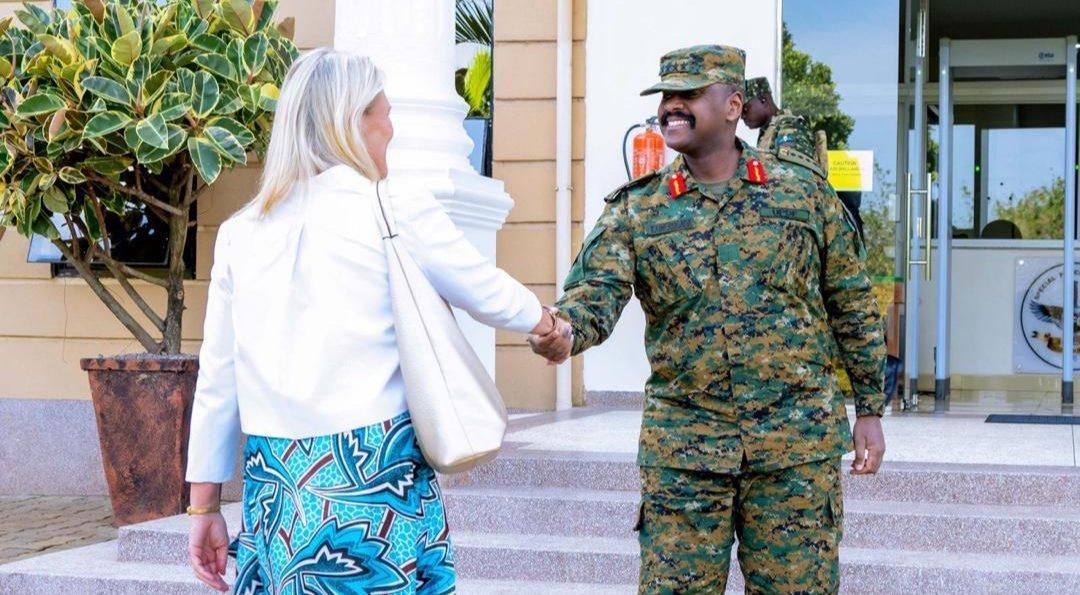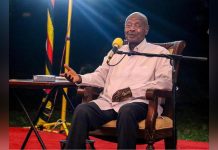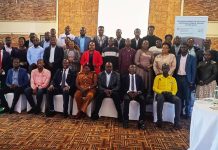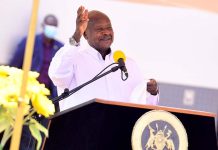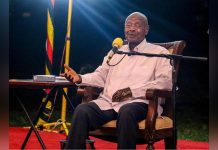By Faridah N Kulumba
Africa-Press – Uganda. The Republic of Uganda and the United Kingdom recently reaffirmed their commitment to deepening defence and security cooperation during the high-level meeting between British High Commissioner Lisa Chesney and Uganda’s Chief of Defence Forces Gen. Muhoozi Kainerugaba in Entebbe Uganda.During the courtesy visit that took place at the Special Forces Command (SFC) Headquarters on 17 October 2025, the two leaders discussed ways to reinforce the long-standing military partnership between Kampala and London.
Uganda and the UK October engagement follow Gen. Muhoozis recent meeting with a delegation from Prince Harry’s Invictus Games Foundation, which is collaborating with the UPDF to support rehabilitation and reintegration programs for wounded service personnel.Also, on 29 August this year Uganda’s CDF had an engagement with Lt Col Ash Wiseman, the British Defence Attaché to Uganda, in which they discussed areas of mutual interests between the two nations.
The agenda
The recent talks focused on regional stability, counter-terrorism collaboration, and enhanced military training programs, underscoring both nations shared interest in maintaining peace across East Africa.General Muhoozi acknowledged the UK’s continued support toward Uganda’s security and professionalization of its armed forces. On the other hand, Ambassador Chesney commended Uganda’s stabilizing role in the region and reiterated Britain’s readiness to broaden defence engagement.Both parties reaffirmed mutual respect and agreed to sustain dialogue through continued high-level engagements, according to the statement issued by the UPDF after the meeting.
How Uganda will benefit from Britain security support
Britain remains one of Uganda’s most enduring defence partners, contributing to training, advisory missions, and peacekeeping capacity development.The official said the renewed discussions reflect growing confidence in Uganda’s evolving military leadership and signal a broader diplomatic effort to strengthen cooperation on global and regional security challenges.The UK has historically provided training and capacity-building support to the Uganda People’s Defence Force (UPDF).
Regional and international context behind the renewal of the cooperation
Uganda and the UK renewed and deepened security cooperation in the context of persistent regional threats in East Africa and a shift in UK foreign policy toward a more mutually beneficial partnership with African nations. Regional- For Uganda, this collaboration is an extension of its long-standing role as a major contributor to regional stability and counter-terrorism efforts. There are interconnected security challenges in the East Africa and Great Lakes regions. Conflicts and instability in neighbouring countries such as the Democratic Republic of Congo (DRC) and South Sudan. Uganda hosts a massive refugee population from these and other nations, making regional stability a primary concern.
Also threats from terrorist groups remain a key priority. Ugandan forces have been central to the African Union Transition Mission in Somalia (ATMIS), fighting against al-Shabaab. Collaboration on counter-terrorism is a central component of the renewed partnership.International – International context: Shifting UK-Africa strategy. The UK’s engagement with Uganda reflects a broader re-evaluation of its partnerships with Africa, moving away from a traditional aid-focused model toward one of “genuine partnerships”. The UK initiated a continent-wide consultation in late 2024 to inform a new “Africa Approach,” scheduled for formal launch in late 2025. This new strategy is based on principles of mutual respect and partnership, emphasizing that UK engagement must reflect African-led priorities.
Diplomatic and security influence: A key aspect of the UK’s updated strategy is leveraging its diplomatic and security expertise to support African priorities. Many African partners, including Uganda, value the UK as a credible security actor with international influence, particularly within the UN.Strategic relationship – For the UK, the relationship with Uganda extends beyond military training. It encompasses diplomatic engagement, trade, investment, and development aid, with a focus on areas like clean economic development and climate resilience.Scramble for power- The UK’s renewed focus on Africa comes at a time of increased global competition for influence on the continent. Middle powers such as the UAE and Turkey, along with other international players, are also actively seeking to strengthen relations with Africa
East Africa’s benefits to the UK’s post-Bexit strategy
Economically- In 2023, the UK introduced the Developing Countries Trading Scheme (DCTS), a more generous trade scheme than the EU’s Generalized Scheme of Preferences. It removes or reduces tariffs on over 99 percent of goods for developing countries, including East African nations, to boost their trade and reduce UK import costs.East Africa is important to the UK’s post-Brexit strategy as a high-growth region for trade and investment, a partner for addressing security issues, and an area to project “Global Britain” influence. The UK has a long-standing historical and economic relationship with the region, providing a foundation for strengthened ties.
Stability- With deep security interests in the Horn of Africa, the UK works with East African partners to counter extremism and address instability. This includes training military forces, as with the British Army Training Unit Kenya (BATUK).Investment- In 2023, the UK and Kenya agreed on a £3.4 billion package of green investment deals to create jobs and foster low-carbon growth, positioning the UK as an alternative investment partner to China.Financial services-The UK aims to use the City of London as a financial hub for channelling private investment into African markets, including East Africa. This strategy supports private sector-led growth.
What the UK is aiming to achieve through this collaboration
According to some analysts the UK government is using cooperation for diplomacy and international influence. Britain has embarked on a long-term strategic approach to its relationship with Africa, aiming for partnerships based on mutual respect and benefit.In 2024–2025, the Foreign, Commonwealth and Development Office (FCDO) conducted extensive consultations with African governments, businesses, and civil society to inform its new approach to the continent.Some African countries such as Uganda, Kenya and Tanzania share historical ties and membership in the Commonwealth provide a flexible and established framework for engagement with those countries.
Criticism on the security agreements
Key criticisms of the UK’s security cooperation with Uganda centre on its perceived disregard for alleged human rights violations and its perceived legitimization of President Yoweri Museveni’s repressive and long-serving regime. Previously the UK froze funding to specific Ugandan security entities in the past over abuses, but critics argue the relationship and broader security cooperation persist despite ongoing concerns. Some UK based human rights activists have protested the supply of arms and military training to Uganda, arguing that this aid strengthens the repressive government and may be used against its own citizens. However, Tom Magambo political analyst in an interview with Africa-Press said the UK security cooperation with Uganda does not focus on military facilitation only but also deepen security and justice sectors on issues like drug trafficking, illegal migration, and financial crime. This also includes technical support and training for the Uganda Revenue Authority to strengthen tax investigations, including cybercrime and e-commerce.
For More News And Analysis About Uganda Follow Africa-Press

